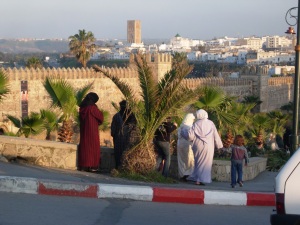For the first time today, I talked for about five minutes straight in nothing but Derija.
I was giving my first Rotary Club presentation to the Casablanca Doyen RC.


The response I got from the club was positive. Embarassingly positive, in fact. Without any false modesty, I have to say that although I’ve been making steady improvement, I’m nowhere near fluency. It speaks to the rarity of Derija learners and the status of the language that the Doyen Rotarians didn’t hold it against me when I had trouble understanding a few follow-up questions in Arabic.
When people ask me what’s the use of learning Moroccan Derija (they only speak it in Morocco!), I want to tell them about the kind of response I’ve gotten today. Any progress you make is rewarded with more affirmation that you’ll ever get trying to learn, say, English. Or French. Don’t even get me started on French.
The flip side, naturally, is that this is only possible in a context where even speakers of the language doubt its value. What is Derija compared to English? What is it even compared to modern standard Arabic?
In trying to take this issue head-on with some classmates, I’ve come up against various and conflicting attitudes that challenge the way I’ve thought about Derija so far.
In class last week, after a presentation on language and globalization, I posed this question: Can we talk about a unified Arabic like we talk about a unified English?
There are a lot of “Arabic speakers” across the world, but in daily life most people speak a dialect that other “Arabic speakers,” hundreds or thousands of miles away, wouldn’t understand. Sure, they might pick up a few words. But just because I get the gist of a conversation in Italian doesn’t mean I speak the same language as Italians.
The reaction that my question provoked in class was more intense than I had expected. I took for granted that Moroccans don’t consider their day to day language to be legitimately “Arabic.” Over and over I’ve heard Moroccans talk about “Derija” as opposed to “al-loura al-3arabia” (“the Arabic Language” a.k.a. “Fus-ha”), occasionally going so far as to classify Derija as less than, or even not as beautiful compared to Fus-ha or other languages more similar to standard Arabic.
The flip side to the relaxed and informal attitude towards Derija is a tendency, among Moroccans I’ve talked with, to take standard Arabic very seriously, both as a language and as a unifier of a transnational community of Arabic speakers and Muslims (with plenty of overlap between the two). I was pretty taken aback when several classmates reacted defensively to my insinuation that Arabic was not a “lived” language.
Something I’ve started to realize now that I’m here is that standard Arabic isn’t as inaccessible as I’d first thought. The Moroccan King always addresses his people in Arabic. One classmate pointed out that it is the language that’s read by millions of people who read the newspaper in Arabic. Another classmate pointed out that the gulf between daily Arabic and written Arabic will narrow with education.
Oh boy, and that’s to say nothing of the ten million Moroccans who speak Tarifit, Tashelhit, or Tamazight.
Sure, I believe in having standards for a language and respect for its rules, but I also think that it’s vital for people to feel proud of the language that they use to communicate every day. When I arrived here a few months ago, one of the first things I noticed that was different from the last time I’d been in Morocco, in 2005, was the television programming. 2M, the national television channel, had started to broadcast foreign soap operas dubbed in Derija, opposed to only standard Arabic or, I would argue worse, Egyptian dialect.
But that’s also because I hate tuning to a program in Egyptian. It frustrates my efforts to learn Moroccan Derija.













